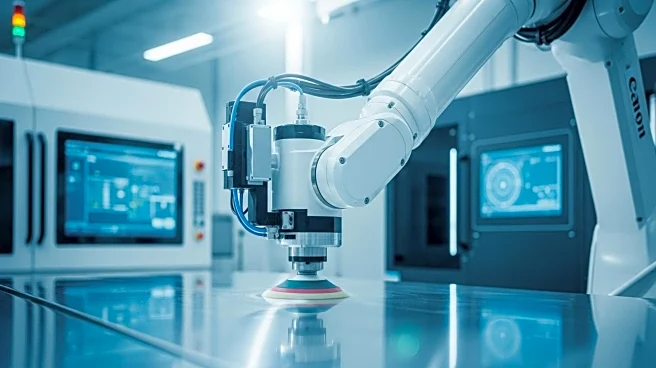What is the story about?
What's Happening?
The manufacturing industry is increasingly recognizing the importance of smarter surface processing techniques, particularly in precision manufacturing. Traditional methods of edge finishing, such as manual and automated brushing, are being replaced by more advanced technologies like Electrochemical Jet Machining (ECJM). This shift is driven by the need for cleaner, more precise alternatives that meet the stringent demands of industries such as aerospace, power generation, and medical devices. ECJM offers significant advantages, including higher precision, reduced rework, and environmental benefits, by using a pH-neutral, saline-based electrolyte. Jonathan Mitchell-Smith, CEO of TextureJet, emphasizes the strategic importance of surface processing in enhancing product integrity, safety, and sustainability.
Why It's Important?
The adoption of smarter surface processing methods is crucial for the manufacturing industry as it seeks to improve component performance while reducing environmental impact. By transitioning to technologies like ECJM, manufacturers can achieve higher yields and lower costs, enhancing supply chain resilience. This shift not only addresses the technical demands of safety-critical industries but also aligns with increasing regulatory and customer expectations for sustainable practices. The move towards smarter surface processing represents a significant transformation in manufacturing, offering competitive advantages to those who embrace these innovations.
What's Next?
As the importance of surface processing gains recognition, manufacturers are expected to integrate these smarter methods into standard practice. The industry is likely to see a rapid adoption of technologies like ECJM, driven by the need to meet performance and sustainability challenges. Manufacturers who prioritize innovation in surface processing will be better positioned to capitalize on efficiency gains and meet the evolving demands of high-value industries. The focus will be on how quickly these methods can be implemented to deliver competitive advantages.
Beyond the Headlines
The shift towards smarter surface processing has deeper implications for the manufacturing industry. It highlights the growing emphasis on sustainability and environmental responsibility, as manufacturers seek cleaner alternatives to traditional methods. This transformation also underscores the importance of strategic innovation in maintaining competitiveness in a rapidly evolving market. As manufacturers embrace these changes, they contribute to broader industry trends towards safer, more efficient, and environmentally friendly production processes.















